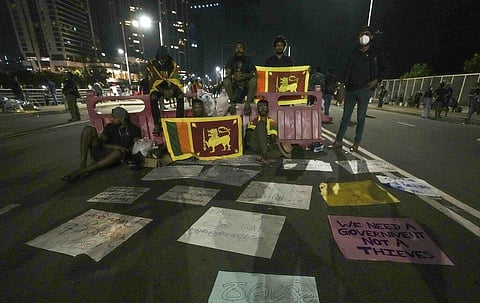

The timing of the Sri Lankan economic crisis could not have been worse for Indian businesses. The uncertainty due to the geopolitical crisis in eastern Europe is already taking a toll on exporters, travel and tourism industry and all other businesses in general, and now with the Sri Lankan economy floundering in the neighbourhood, things can’t get bleaker.
The island nation is smaller in size but is of significant interest for India, both strategically and economically. Several Indian companies have a presence in the country.
According to Indian High Commission in Sri Lanka, major investments from India are in the areas of petroleum, retail, IT, financial services, real estate, telecommunication, hospitality & tourism, banking and food processing, metal industries, tyre manufacturing, cement, glass manufacturing, infrastructure development (railway, power, water supply) etc.
Companies like Tatas, Bharti Airtel, Indian Oil, Mahindra & Mahindra and several Indian banks like SBI and Indian Overseas Bank operate in Sri Lanka.However, exporters and the travel and tourism industry are most affected by the recent crisis, it seems.
Exports
India is the biggest trading partner of Sri Lanka with around $6 billion annual trade. India had exported $5 billion worth of goods and services in 2020-21 with textile, metals & steel, ships and boats, capital goods being the major exports to Sri Lanka. Sri Lanka accounted for 1.3% of India’s total exports in 2020-21.
The crisis (in Sri Lanka) has hit most exports to the country barring the essential items like food and pharma goods, says Ajay Sahai, Director General and CEO of Federation of Indian Export Organisations (FIEO).
He adds it is a humanitarian crisis and the government of India must support Sri Lanka with financial help to ensure exports of essential items are not disrupted.
The Indian government has extended a Line of Credit (LoC) of $500 million to Sri Lanka for the purpose of financing purchase of petroleum products from India.
Out of the total credit by Exim Bank under the agreement, goods, works and services of the value of at least 75% of the contract price will be supplied by the seller from India, and the remaining 25% of goods and services may be procured by the seller for the purpose of the eligible contract from outside India.
Indian imports from Sri Lanka are small adding up to around $1 billion most of it comprising tea, coffee, spices, animal fodder, edible nuts, among others.
Travel and tourism
Tourism and hospitality industry is one of the major contributors to Sri Lanka’s economy, approximately 12% to its GDP and is the fifth largest source of foreign revenue in the country.
India plays a big role in this as the total number of tourist arrivals from India to Sri Lanka during pre-covid year (January-December 2019) was 355,002, or 18.2% of the total tourist arrivals into Sri Lanka.
The current economic turmoil in Sri Lanka is unlikely to benefit India when it comes to attracting tourists who are seeking an alternative.
According to travel industry experts, increased airfares are a big concern for leisure travel and that other South Asia nations are better placed to attract tourists, thanks to their friendly policies.
“In normal course (referring to the current crisis in Sri Lanka), it should have benefitted India but the countries like the UK which have high number of people travelling to Lanka, don’t have an E-visa arrangement with India, and with Easter Holidays around, I am afraid we won’t benefit much,” said Rajiv Mehra, President, Indian Association of Tour Operators (IATO). Mehra added that the current airfares are exorbitantly high and leisure travel has been hugely impacted by this.
A one-way economy class flight between Mumbai and London is costing a traveller anywhere between Rs 30,000-40,000 if one has plans to travel in the next one week. Non-stop flights may even cost Rs 10,000 extra. According to a travel agency executive, tourist inflow in the island nation has been on a downward trajectory since the Easter bombings that took place in April 2019.He said, “After the attacks, Covid-19 pandemic wiped out tourism in Lanka and now when the global tourism industry is showing signs of recovery, Sri Lanka has gone into a deep economic crisis.”
When asked if India’s tourism sector stands to gain from this, the executive said that some pockets such as Kerala, the Andamans and Goa are seeing increased interest, but for foreign travelers, Sri Lanka has always offered a different experience, thanks to its excellent beaches.
TNIE contacted several Indian companies with business exposure in Sri Lanka, but they declined to comment on the issue.
India, which hasn’t issued a warning as such, is also witnessing a lower flight movement between the two nations due to poor passenger load factor.